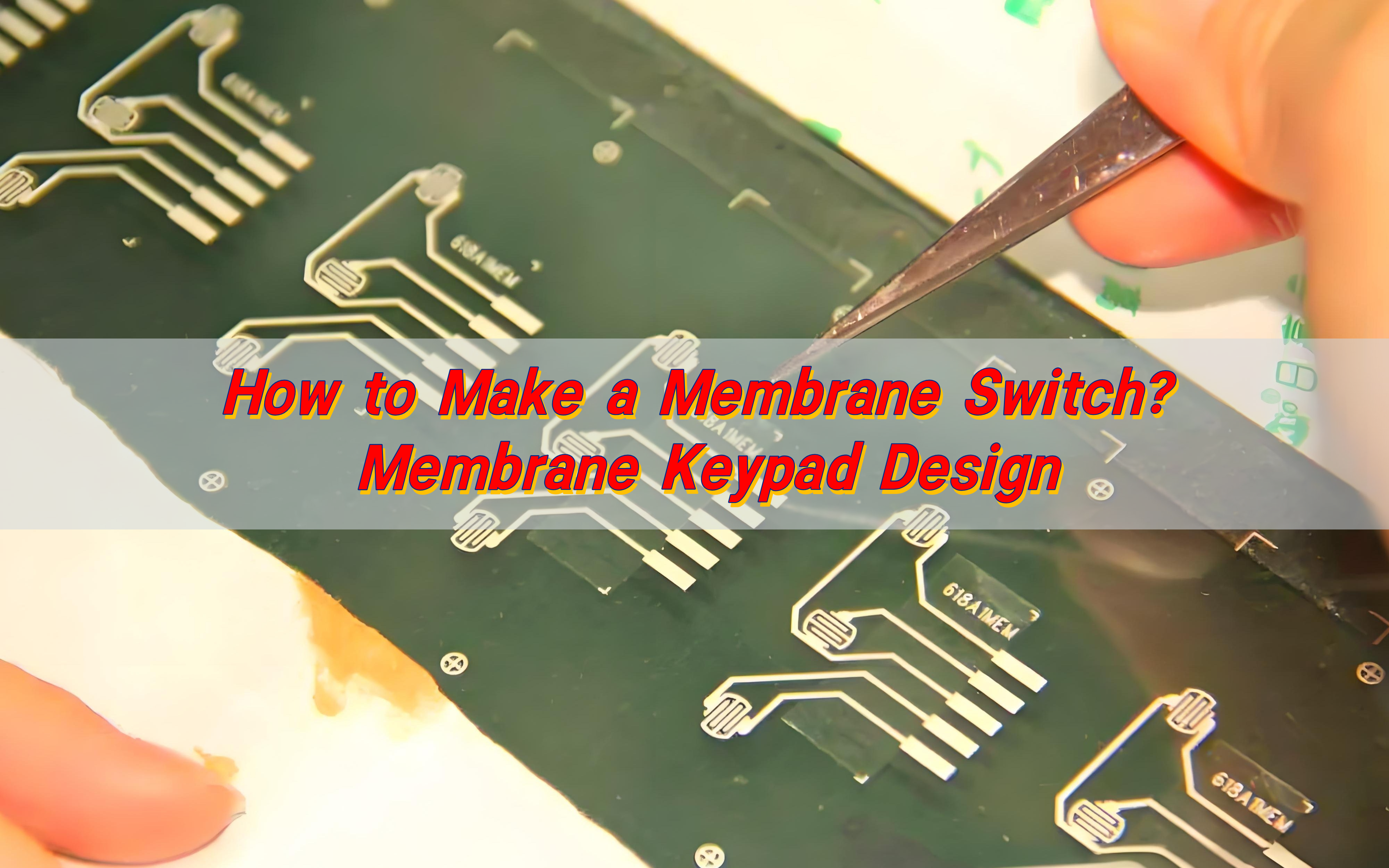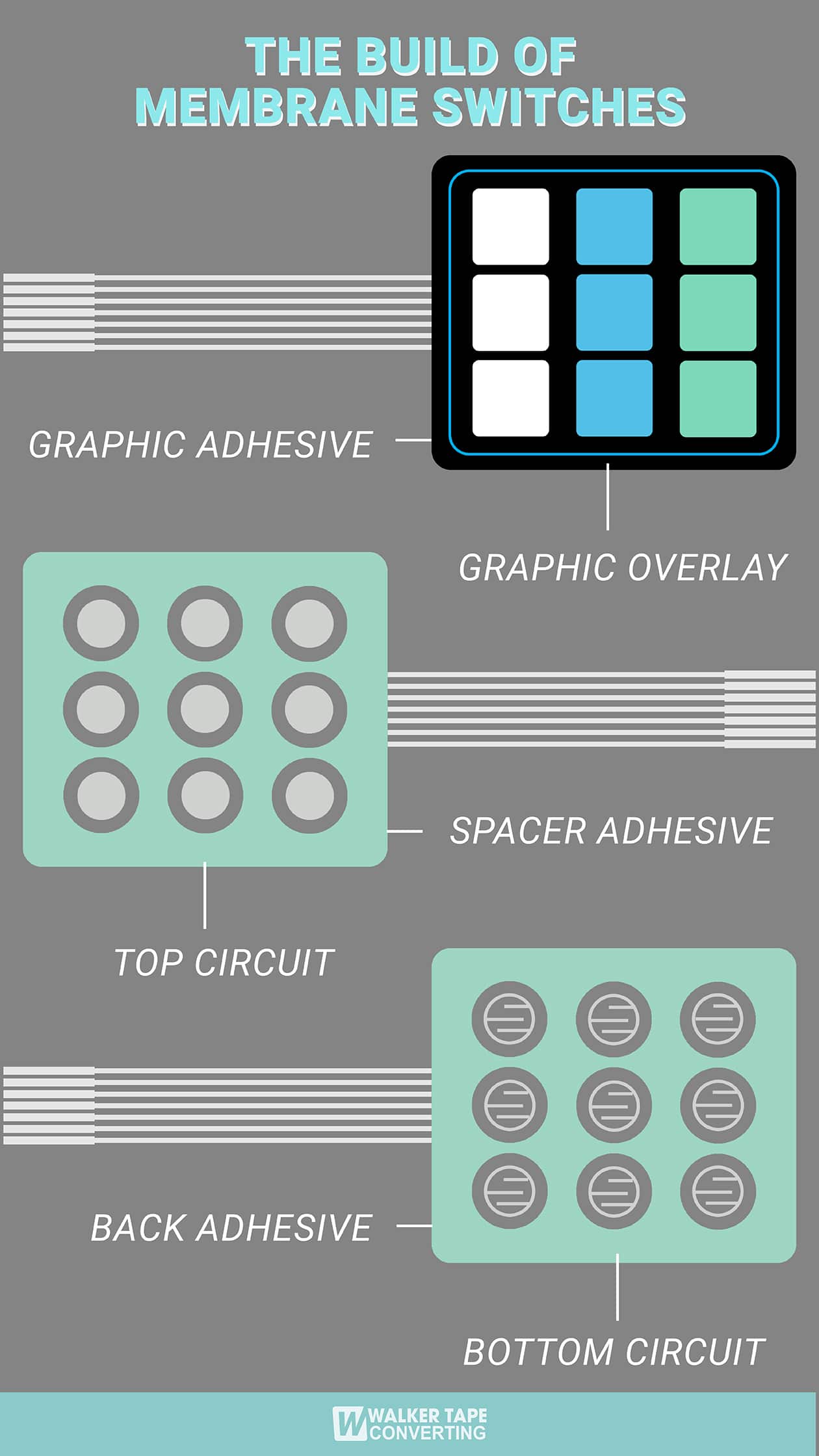Comprehensive Membrane Switch Manufacturer for Specialized Applications
Comprehensive Membrane Switch Manufacturer for Specialized Applications
Blog Article
Comprehending the Importance of Membrane Switch in Modern Electronics and Their Applications
Membrane switches over function as an important element in modern electronics, supplying an effective user interface for user communication. Their lightweight and personalized nature makes them ideal for a series of applications throughout diverse sectors. Comprehending their key parts and advantages can provide understandings into their expanding importance. As technology remains to development, the advancement of Membrane changes questions about their future applications and style technologies. What lies ahead in this vibrant area?

What Are Membrane Buttons?
Membrane switches are crucial parts in contemporary electronic devices, working as customer interfaces that assist in interaction between gadgets and individuals. These switches contain a number of layers, including a visuals overlay, a sticky layer, and a circuit layer, every one of which interact to produce a functional and sturdy interface. The layout permits a level, low-profile remedy that can be personalized pertaining to size, form, and visual look, making them suitable for different applications, from consumer electronics to medical tools. The tactile responses provided by Membrane switches over enhances individual experience, while their resistance to dirt and wetness makes them excellent for challenging settings. Membrane buttons can include functions such as backlighting and published graphics, further increasing their usability. Their convenience and robustness make them a recommended choice in sectors where integrity and ease of use are paramount, eventually contributing to the smooth operation of modern digital tools.
Secret Elements of Membrane Changes
While different parts add to the functionality of a membrane switch, three main layers play considerable functions in its style and operation. The leading layer, usually made from a long lasting polymer, acts as the user interface for customer communication, usually including published symbols and graphics. Under this is the spacer layer, which keeps the needed range between the leading layer and the circuit layer. This spacer layer warranties that the switch activates just when pushed, preventing accidental inputs. The circuit layer includes conductive traces that complete the electrical circuit when the leading layer is dispirited. These traces can be made from different materials, including copper or silver. With each other, these parts produce a trustworthy and robust device that is compact and functional, ideal for a large range of electronic applications, from household devices to clinical gadgets. Understanding these key parts is crucial for appreciating the total capability of Membrane buttons.
Benefits of Using Membrane Switches

Membrane Switch Production Refine
Understanding the Membrane switch production process exposes the detailed steps entailed in creating these crucial parts. The procedure commonly starts with the style stage, where specs and formats are created utilizing specialized software. Following this, the visuals overlay is printed on a flexible substratum, usually using high-resolution printing methods to assure clarity and precision.Next, the adhesive layers are used, which offer to bond the various elements with each other. The circuit layers, made from conductive inks or products, are after that printed onto a different substrate. These layers are thoroughly aligned and laminated to develop a useful switch.After setting up, the switches undertake evaluating to validate functionality and durability. Quality assurance steps are executed throughout the procedure to identify and correct any issues. Lastly, the completed Membrane buttons are packaged and planned for circulation, prepared to fulfill the demands of contemporary electronic applications.
Applications of Membrane Changes in Different Industries
Membrane buttons are progressively used across different sectors, specifically in medical tools and customer electronic devices. In the medical area, they provide dependable control user interfaces for devices that require accurate operation. In customer electronic devices, these switches improve user interaction by using responsive and streamlined user interfaces. Receptive Medical Devices Control
Many contemporary clinical gadgets make use of Membrane switches for streamlined procedure and improved user interaction. These buttons provide a dependable, resilient user interface for a selection of applications, including analysis devices, patient tracking systems, and medical tools. Their customizable designs enable particular designs that can accommodate the one-of-a-kind needs of health care professionals, ensuring instinctive navigating and effective accessibility to necessary features. In addition, Membrane buttons are resistant to pollutants, making them ideal for clean and sterile environments. The responsive comments they use can improve customer self-confidence, lowering the danger of mistakes throughout important medical treatments. On the whole, the combination of Membrane buttons in medical devices considerably adds to boosted functional efficiency and client safety and security in medical care settings.
Customer Electronic Devices Interfaces
In the domain name of consumer electronic devices, Membrane buttons play an essential function in boosting interface throughout a variety of devices. These switches are indispensable to this website items such as remote controls, microwaves, and pc gaming consoles, providing a efficient and easy to use user interface. Their style allows for a smooth combination of graphics and performance, allowing suppliers to produce smooth, modern looks without compromising use. Membrane switches are additionally known for their resilience, often standing up to considerable use and direct exposure to numerous environmental problems. In addition, they can incorporate features like backlighting and tactile comments, additional boosting the user experience. As customer needs for innovative yet instinctive user interfaces expand, Membrane changes remain to be an important element in progressing digital device functionality.
Layout Considerations for Membrane Changes
Designing effective Membrane switches over needs careful focus to different variables that affect both performance and individual experience. One essential factor to consider is the option of products, as they can affect longevity, tactile comments, and aesthetic charm. Selecting an ideal adhesive is vital for ensuring lasting bond and resistance to environmental factors.In enhancement, the format and layout of the switch need to accommodate user communication, with switch dimensions and spacing optimized for ease of use. The incorporation of graphics and labeling should prioritize quality and visibility under numerous lights conditions.Consideration of electric Learn More Here characteristics, such as actuation pressure and switch level of sensitivity, will enhance the responsiveness of the Membrane switch. The design must accommodate making procedures to assure cost-effectiveness and timely production. On the whole, a well-balanced layout boosts both the customer and the functionality experience of Membrane switches in modern-day electronic devices.

Future Trends in Membrane Switch Innovation
As modern technology remains to develop, Membrane switches are poised to incorporate brand-new innovations that will improve their functionality and application in various areas. One significant fad is the incorporation of resilient and versatile products, which will certainly increase the life-span and reliability of these buttons. Improved surface textures and customizable graphics are also expected, allowing for more user-friendly individual interfaces.Moreover, the combination of smart innovation, such as touch-sensitive surface areas and haptic feedback, is expected to boost customer interaction, making Membrane switches extra interesting and responsive. Additionally, developments in published electronic devices will enable much more complicated wiring within thinner accounts, additionally broadening layout possibilities.Sustainability will additionally play a vital function in future developments, as manufacturers discover environment-friendly materials and manufacturing procedures. On the her response whole, these patterns will certainly assure that Membrane switches continue to be essential and appropriate in a significantly digital and interconnected world.
Often Asked Questions
How Do Membrane Switches Contrast to Standard Mechanical Switches?
Membrane switches offer advantages over conventional mechanical switches, consisting of lowered size, lighter weight, and enhanced longevity. They typically supply a sealed surface, enhancing resistance to dirt and dampness, making them perfect for diverse applications.
What Products Are Generally Made Use Of in Membrane Switch Construction?

Can Membrane Changes Withstand Extreme Environmental Conditions?
Membrane buttons can withstand severe ecological problems, depending on their design and materials. Top notch constructions frequently include sturdiness against temperature variations, moisture, and direct exposure to chemicals, making them suitable for numerous demanding applications throughout markets.
Just How Long Do Membrane Switches Usually Last Prior To Failing?
Membrane switches over typically show a lifespan ranging from 1 to 10 million actuations, relying on factors such as use frequency, ecological conditions, and making top quality. Regular upkeep can expand their durability and operational reliability significantly.
Are Membrane Switches Personalized for Particular Applications?
Membrane buttons are undoubtedly adjustable for certain applications. They can be tailored in style, capability, and dimension, enabling makers to satisfy distinct individual demands and boost item aesthetics while preserving functional efficiency and toughness. Membrane switches are vital elements in modern-day electronic devices, serving as user interfaces that promote communication in between devices and users. The tactile feedback supplied by Membrane changes enhances customer experience, while their resistance to dirt and moisture makes them excellent for testing environments. The incorporation of graphics and labeling need to prioritize clearness and exposure under different illumination conditions.Consideration of electrical characteristics, such as actuation force and switch sensitivity, will improve the responsiveness of the Membrane button. Boosted surface area structures and adjustable graphics are likewise anticipated, permitting for more intuitive user interfaces.Moreover, the combination of wise technology, such as touch-sensitive surfaces and haptic responses, is expected to boost user communication, making Membrane switches extra receptive and interesting. Membrane switches over offer benefits over standard mechanical buttons, consisting of lowered size, lighter weight, and improved toughness.
Report this page